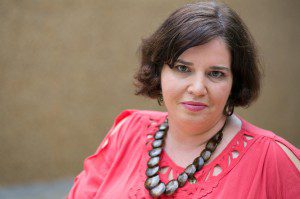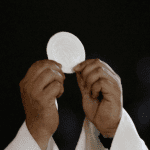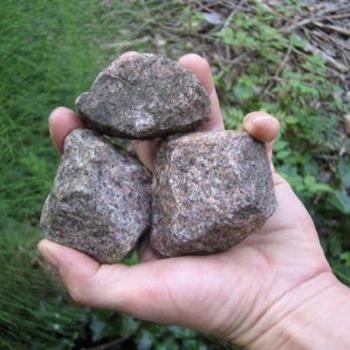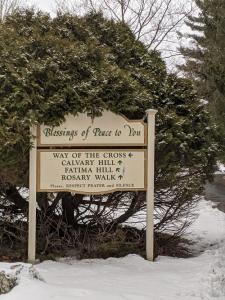
For the last year my faith has been a gritty, dig in and get dirty in real life affair. I’ve stirred the beans and served the soups and lifted newborn babies from the womb to the breast, dirtying myself with the smell of the gorgeous flock my missionary life here in Costa Rica has generously given me. Like Jacob caring for Laban’s sheep while waiting for his final reward and a return to his homeland (Genesis 29), I’ve let the dirt of a foreign land settle on my feet. I daily labor hard to make faith look like the love that walked the earth in the skin of Jesus. I know God in the shades of green that fleck my mountain life. I touch him in the aching back of a laboring woman, and smell him on the forehead of a newly baptized godchild.
Until there is suddenly an unfamiliar twist in that path that stops me in my tracks and sends my mind searching for a map to guide my steps: A bloody host with the flesh of a broken-hearted man. A small snippet of Catholic teaching that my husband mentions to me in simple conversation, not thinking it required a trigger warning. (Limbo: it pricks the scabs of my deepest losses and sends them oozing the most bitter of all my burning questions of God.) And then, a question I never knew I needed to ask, a great and difficult theological question that is at once universal and personal, a thread pulling me back through the ages of womanhood. To answer it I have to reach for the hand of my sister Eve and pull her up and out into the light. There is a sense that no one else’s answers will satisfy me. No map made by someone else will do. And so now I am walking half-present through my days while I offer half my mind to dropped bread turned heart-flesh and the question of eternal salvation for innocent souls and who Eve might have become had she never eaten that apple.
I’ve never been much of a regimented theologian, trained in classical schools of religious thought. I flit down the paths of intellectual pursuit as it fancies me, pursuing an academic knowing of God when my heart desires it. But I am, without a doubt, a thinker—one to push against boundaries and ask curious questions of my faith, its traditions and ways.
I’ve reveled in knowing that I could push against the veil that divides the Divine Mind from human knowledge and it would be okay. I have a maybe too daring confidence in the fact that God will hold, that on the other side of all my questions is a reality so much bigger than my small mind’s wanderings that I will find that I’ve figured and configured and discovered the deepest truths I can and still have only drunk a drop from the sea.
Maybe I’ve always felt free to play in the fields of theology’s most pressing questions because I’m quite aware that at the end of all our understanding and explanation, every question about God ends at Platform 9 ¾.
Okay, maybe you weren’t expecting a Harry Potter reference there. Bear with me. If you don’t understand said reference, I’m going to have to ask you to look it up on your own. If I start quoting Harry Potter, we might be here for a very, very long time. And I have things to ponder, as I’ve already told you.
When young Harry arrives at that point in his life where he is perched precariously on the edge of the place of promise he can neither see nor offer an explanation for, he has two options. Step back from the edge of risk and into a life that offers neither safety nor comfort, but a familiarity that sometimes can be strangely satisfying in its own bitterness. Or leap into a mysterious realm that is majestic and terrible at once, where he will never know quite what to expect except that there, he truly belongs.
In the decision to make the jump, he does not yet even have that assurance, of his belonging in that place. All he really has is a compulsion to know that beyond the brick wall there is a world better than the bitter one he has known.

And so I too go through my days living mostly at peace my place on this side of the veil. But there are moments when my mind takes me down new roads of relationship with my God, begging a fresh understanding of his confounding ways, and I willingly walk through the places my thoughts take me.
And at the end of all those paths, my feet land on the last sure ground and I stand facing a brick wall, with the baggage of my humanity in hand, and I am offered an invitation. Trust the magic and leap into the great and terrible mystery of what it means to believe—have faith that there is a place on the other side where bleeding bread that beats with the heart of God makes sense, and I know the truth about the souls of little ones who dissolved into the great unknown before being dipped through the holy fountain of grace, and Eve takes my hand and walks me to my place at the table. A place where I belong and I am known and welcomed.
These days, I tend to be a bit like Harry launching onto Platform 9 ¾ as a student now well-acquainted with mysterious ways of a magical kingdom. Confident and more excited than afraid. Certain that while a battle rages on the other side, the mystery itself is good and holy. And it will open for me when I leap and lead me to the place where mystery and faith meet, and the great and terrible holiness of God guides us all on a path to knowing who we really are.
Colleen C. Mitchell is the author of the forthcoming book Who Does He Say You Are? Women Transformed by Christ in the Gospels (Servant, 2016). She’s wife to Greg and mother to five amazing sons here on earth and five babies in heaven. Colleen and Greg are foreign missionaries in Costa Rica, where they run the St. Francis Emmaus Center, a ministry that welcomes indigenous mothers into their home to access medical care. She works out what it means to trust Jesus, grieve well, and live a raw faith at her blog Blessed Are the Feet.













